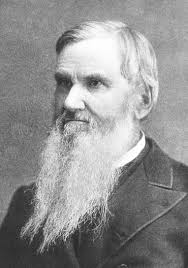Editor’s Note: A Sermon by Robert Lewis Dabney. Preached near Mossy Creek, Augusta, Va. May, 1862 to the 44th Va. Regiment.
Ye ask, and receive not, because ye ask amiss. James 4:3 Brethren, The subject of our ineffectual prayers should be one of lively interest to all of us. There has been, apparently, much asking among us. Often the Sabbath witnesses four formal prayers, in which we all profess to unite our voices and hearts, in a general concert. Many praying circles weekly, or perhaps daily, offer up their social petitions to God with less publicity. Every Christian waits before his God in secret, every day. Many large and varied requests are urged with him habitually, and with every form of repetition. But, alas; there has been much less ‘receiving’ than asking. Our prayers are, in seeming, abundant, and our answers scanty. Do you say, it is unsafe for shortsighted man to judge positively in this matter; because many of the prayers of christians may be graciously accepted by their Father, and yet not specifically granted, for the reason that omniscient love has seen it was more merciful to withhold than to give; or because our God may purpose a full answer, but he may have seen that the fullness of time has not yet come; or because he is bestowing the gift, but in a way so different from our expectations, that we scarcely recognize it? I grant it all; but, after making allowance for such explanations, in every case to which they can be fairly applied, we must admit that a multitude of our requests remain wholly unanswered. We have prayed for growth in grace: Are we indeed advancing to the measure of the stature of perfect men in Christ Jesus? We have invoked the witness of the Spirit with our spirits: Are we rejoicing in hope of the glory of God? We have prayed for revival, and for the redemption of the souls of our heedless comrades: But alas; the ways of Zion still mourn, and our fellows are even now falling around us, unprepared, by battle and disease. We supplicate God to deliver our beloved country from the destroying sword; but enemies throng around her in increasing numbers, and assail her with more determined ferocity. Surely, we ask, and we receive not.
 But see, how positive is the connection established by the promises of God, between believing prayer, and the answers. For every one that asketh receiveth; and he that seeketh findeth; and to him that knocketh it shall be opened.” (Matt. 7:8) “And all things whatsoever ye shall ask in prayer, believing, ye shall receive.” (Matt. 21:22) “Verily, verily, I say unto you, whatsoever ye shall ask the Father in my name, he will give it you.” (John 16:23) Are these pledges abrogated? Is prayer now an unmeaning and fruitless form? Of old, it was not so; when holy men prayed in faith, heaven was moved, and God stooped to earth. There was a time, when the saints “through faith Our Ineffectual Prayers 2 subdued kingdoms, wrought righteousness, obtained promises, stopped the mouths of lions, quenched the violence of fire, escaped the edge of the sword, out of weakness were made strong, waxed valiant in fight, turned to flight the armies of the aliens.” (Heb. 11:33-34) Elias was a man subject to like passions as we are, and he prayed earnestly that it might not rain; and it rained not on the earth by the space of three years and six months. And he prayed again, and the heaven gave rain, and the earth brought forth her fruit.” (James 5:16-18) It was true in those days, at least, that “the effectual, fervent prayer of a righteous man availed much.”
But see, how positive is the connection established by the promises of God, between believing prayer, and the answers. For every one that asketh receiveth; and he that seeketh findeth; and to him that knocketh it shall be opened.” (Matt. 7:8) “And all things whatsoever ye shall ask in prayer, believing, ye shall receive.” (Matt. 21:22) “Verily, verily, I say unto you, whatsoever ye shall ask the Father in my name, he will give it you.” (John 16:23) Are these pledges abrogated? Is prayer now an unmeaning and fruitless form? Of old, it was not so; when holy men prayed in faith, heaven was moved, and God stooped to earth. There was a time, when the saints “through faith Our Ineffectual Prayers 2 subdued kingdoms, wrought righteousness, obtained promises, stopped the mouths of lions, quenched the violence of fire, escaped the edge of the sword, out of weakness were made strong, waxed valiant in fight, turned to flight the armies of the aliens.” (Heb. 11:33-34) Elias was a man subject to like passions as we are, and he prayed earnestly that it might not rain; and it rained not on the earth by the space of three years and six months. And he prayed again, and the heaven gave rain, and the earth brought forth her fruit.” (James 5:16-18) It was true in those days, at least, that “the effectual, fervent prayer of a righteous man availed much.”
But He to whom we pray is “the Father of lights, in whom is no variableness, neither shadow of turning.” How then, can we suspect that God is no longer true to his promises? Nay: “Let Him be true, but every man a liar.” The solution of our ineffectual prayers is to be found not in God’s unfaithfulness; but in our unbelief: “We ask, and receive not; because we ask amiss.” Let us then, examine the nature of our prayers in order that we may both justify our God, and amend what is amiss in ourselves.
First, may not one reason of our disappointment be suggested by the words following the text? We “ask amiss that we may consume it upon our lusts.” This word, lusts, usually bears, to our apprehension, the meaning of sensual appetites and desires; of something both unlawful, and gross. We misapprehend the sense of the sacred writers in it. True, in the New Testament it usually signifies the bodily desires; but desires are not therefore unlawful, merely because they are bodily. The word which signifies evil concupiscence, whether of body or spirit, is a different one; and this word, “lusts,” suggests no more by its proper meaning, than man’s natural desires for natural enjoyment. Perhaps, when you heard the Apostle James rebuke his readers for offering to God, prayers prompted by their own lusts, you had before your mind a picture of some soul so besotted in superstition and gross ignorance, as to insult the holiness of God, by asking of him only material good, for the purpose of lavishing it in foul and criminal orgies of sensual excess. And it is not strange that you felt, this picture was too monstrous to be verified in your petitions to God. But you limit the charge of the Apostle unwarrantably. He brings this general accusation; that if any man is prompted chiefly by the wish to expend God’s gifts in natural gratification, legitimate, or illegitimate; that man asks amiss. If the propensity you thus seek to gratify be unlawful, then plainly, your request is an insult to both the righteousness and purity of God. But if it be innocent, still it may not be proper for you to make it your predominant motive. This is inordinate; it savors of the sin of idolatry; its tendency is to dethrone God, and exalt self as the chief end; it is inconsistent with that supreme love for God, and zeal for his glory, which are the very essence of christianity. Need we be surprised that even a merciful and pardoning God, who receives the petitions of sinners through their Advocate, Christ, should consider himself constrained by his own honor, to refuse such prayers as these?
Now then; when you ask for the salvation of comrades, of children, are you moved only by natural affection for them? Natural affection is right in its place. But if you give it the supreme place, what is this but saying to the Searcher of Hearts, that you greatly desire that his attributes and mercies shall be made to subserve the advantage of those creatures whom you love; but care not whether they shall subserve the glory of their Creator and rightful proprietor, and Redeemer? When you ask independence and just government, and prosperity, for our beloved country, is it merely from pride; from anger; from the desire that you, and those dear to you by natural ties, may enjoy the material good of a prosperous commonwealth? Or is it chiefly because you desire to see the righteousness of God’s providential rule over nations mani- Our Ineffectual Prayers 3 fested, and the resources of a free and happy people consecrated to his glory? You pray for the prosperity of Zion: Is it that party-spirit may be gratified; or, that Zion’s Redeemer may “see of the travail of his soul, and be satisfied”? I beseech you, examine in this manner, all your prayers; and see whether you do not ‘ask amiss, that you may consume it upon your lusts’?
Second. It maybe that we err in allowing some other dependence than Christ’s righteousness and intercession to insinuate itself into our prayers. Do not be too confident, I beseech you, in rejecting this surmise. I know that you are all members of the great Protestant communions, which hold the doctrine of a gracious justification as “the article of a standing or falling church”; and that you are all familiar with your Bibles, where they say that ‘no man cometh unto the Father but by Christ.’ I know how you have been taught to recite in your catechisms the very definition of prayer, as “the offering up of our desires unto God, in the name of Christ”. I know that you have been instructed in the things of God, far beyond that gross ignorance, which avows the vain expectation of procuring his favor by alms, or by mortifications, or fastings, or idle repetitions. I hear you begin and end your prayers with the orthodox formularies, which make due mention of the name of Jesus Christ as your only plea.
But, brethren; our hearts are deceitful. Self-righteousness is a potent, cunning treacherous enemy. Be not so certain that it is expelled, merely by the use of a correct form of words. “Leviathan is not so tamed.” Thrust out self-righteousness by the door; and it will return by the window. Pride, like a Proteus, when evicted in one form, will assume another, and re-enter unobserved. You have approached the mercy-seat with heartfelt confessions of guilt; and have expressly repudiated all dependence on your works and alms giving. But may it not be, that after this, a lingering hope is harbored, that now God must hear you, because of the merit of your contrition, or of your self-abnegation; or of your strong faith; or of your perseverance in prayer? What is this but self-dependence? You must not only say, but feel, that your contrition, however genuine, your faith itself, however scriptural, constitute no claim of merit whatever in themselves; and that the only reason God may not justly reject your prayer, notwithstanding the truest faith, is, that, He has condescended, of his own free grace, to promise to Jesus Christ the reception of all who come in his name. The only merit is that of our Redeemer’s righteousness and intercession. If any other trust intrudes, you ask amiss.
 Third. It is more probable, that there is a lack of earnestness and fervency in our prayers. This lamentable defect betrays itself in our lack of expectation and pointed desire, and in the absence of watchfulness. We do not “watch unto prayer”. We do not anxiously wait for God, and stand looking to see whether the answer to our request be coming. How often do we remember at night, what it was, for which we prayed in the morning? Would it not often tax the recollection of a christian congregation, to state the main points of the prayer offered by the minister, before they had left the house of worship? And this shameful forgetfulness is not wholly the fault of the people; but the minister also not seldom, shows, by the aimless, and pointless language which flows at random from his mouth, that he is professedly praying, not because either he or the people have any heartfelt errand to press at the throne of grace, but because they feel it incumbent on them, to comply with the customary form of prayer. Now, true desire is always definite. If a man wants, he wants something; and he will be very sure not to forget that thing. But so little in earnest are we, that the answer to many of our prayers would probably take us by surprise, if it were granted.
Third. It is more probable, that there is a lack of earnestness and fervency in our prayers. This lamentable defect betrays itself in our lack of expectation and pointed desire, and in the absence of watchfulness. We do not “watch unto prayer”. We do not anxiously wait for God, and stand looking to see whether the answer to our request be coming. How often do we remember at night, what it was, for which we prayed in the morning? Would it not often tax the recollection of a christian congregation, to state the main points of the prayer offered by the minister, before they had left the house of worship? And this shameful forgetfulness is not wholly the fault of the people; but the minister also not seldom, shows, by the aimless, and pointless language which flows at random from his mouth, that he is professedly praying, not because either he or the people have any heartfelt errand to press at the throne of grace, but because they feel it incumbent on them, to comply with the customary form of prayer. Now, true desire is always definite. If a man wants, he wants something; and he will be very sure not to forget that thing. But so little in earnest are we, that the answer to many of our prayers would probably take us by surprise, if it were granted.
Now praying thus, can we wonder that we do not receive? Such petitions are an insult to the kindness of the benefactor to whom Our Ineffectual Prayers 4 they are addressed. We go to a human friend, and tell him of some great exigency which threatens our happiness, or perhaps, our very existence. We tell him that he alone has the means of our deliverance; and we beseech him, of his compassion, to extend to us the aid which is for our very lives. He replies by reminding us that it is no small thing which we ask, but we are in substance requiring him to sacrifice for us his own dearest interests. We reply: “Yea, we know this; but we thought that our extremity, and your love would combine, to make you feel that even such a request was not too presumptuous.” He then, moved with compassion, decides that he will give our request favorable consideration; and that his answer shall be made known when the day of our necessity is fully come. Well, the season passes by; and our friend has generously determined with himself, moved by his magnanimous and tender heart, that he will even make the sacrifices necessary to grant us relief. He comes; he begins to announce his noble purpose; when, lo! He finds us oblivious of the whole transaction, of the pretended exigency, and of our own request. What must he conclude? but that our anxiety and danger were a mockery, and that his compassion has been shamefully abused. He will turn away in honest indignation, saying: “Henceforth, if these hypocrites fall into trouble, let them help themselves, if they can”!
But if such righteous anger is natural in a fellow creature, what should we not expect, when we mock, with a similar heedlessness, the Majestic King of Kings? We, who are guilty worms in his sight, thrust ourselves through all the shining ranks of the angels, and ask that the Almighty shall turn to us, and divide his attention between the vast affairs of his universal empire, and the worthy praises of the heavenly principalities, and our little woes and sins. We claim of him assistance purchased for us by the blood of his own Son. And when he stoops with infinite condescension to bestow it, he finds that we have forgotten our own petitions and his mercy and majesty, amidst the trivial, and perhaps, sinful toys of the hour! Well is it for us, that God’s ways are as high above ours as the heavens above the earth; otherwise, such prayers would not only fail of answers, but bring down on us the swift lightening of His wrath.
In seeking such gifts as those of redemption, from such a God, it is reasonable that we should be not only honest and sincere in our petitions, but fervent. God and his grace deserve such homage at our hands. You may object that fervor of emotion is a thing to which it is difficult to affix an exact measure. Perhaps you ask, whether I require that your heads should conceive, and your hearts feel the full moment of heavenly things, in order that God may recognize you as coming “in spirit and in truth.” No: The man lives not who does, or can appreciate, either with head or heart, the blessings of redemption and the woes of the second death. They are unutterable; we are finite. Nor do I require that the believer of feeble soul shall feel as large a flood of sacred emotion, as the great and blazing spirit; nor that he who is naturally phlegmatic should burn with the same warmth, as the ardent, impulsive nature; nor that the same believer shall feel, in every hour of lassitude, of distraction, of depression, the same liveliness of emotion, which attended his first espousal to Christ, and the seasons of greatest elasticity of animal spirits. But is it not reasonable, that whether we be calm or passionate, light of spirit or heavy, we shall be at least in thorough earnest, whenever we ask the attention of our God to our wants? It is entirely conceivable that a man may be terribly in earnest, and yet very deliberate. No such measure is proposed for the efficacy of our prayers, as that they shall be uttered with strong crying and tears, or that they must be warmed by so many degrees of conscious emotion, in order to be acceptable. But it is conceived that God exacts of us this standard; that whether our emotion be much or little, our practical estimate of his Our Ineffectual Prayers 5 gifts at the time shall truly place them above all earthly gifts. He demands of us, that we shall at least, not give the world our preference over him, in our desires and efforts. You go to your closet, my brother, at morning, and there ask God that you may “grow in grace, and in the knowledge of the Lord.” Do you then go to your place of business, and demonstrate by your conduct, that your soul is more thoroughly set upon growing in wealth? This earthly object may be very soberly and calmly pursued; and yet, it may be the dominant object of your heart. Or did you go to your closet to pray that a beloved child might become an heir of heaven, and then go forth and exhibit more practical zeal that he might be fashionable or distinguished? What I claim for God is, that, though the temper in which you pursue his gifts be sober, calm, deliberate, it shall be your dominant temper; it must give Him and His redemption the sincere preference over all created good. Otherwise you ask amiss.
 For, it would not be proper, that God should bestow Himself upon a soul which thus treats him with comparative depreciation: All the vicarious merit of Christ’s righteousness wrought in place of the sinner cannot make it prosper. What, shall man thus tacitly inform God, in his very prayers, that he idolatrously prefers self, and selfish good, to those pure and heavenly gifts, which Christ died to purchase for him with his precious blood; to dispense which he now sits upon the throne of the Universe, governing all things for the Church’s sake; to minister which mighty angels fly on their zealous errands; which all heaven admires and studies; and shall such a petitioner expect success? Should the Almighty answer such prayers, he would seem to make Himself an accomplice in our degrading estimate of his blessings; and to assent to the dishonor done himself. He will not do it. Surely it is little enough to demand of a beggar, that he shall not disparage the boon which he receives gratuitously.
For, it would not be proper, that God should bestow Himself upon a soul which thus treats him with comparative depreciation: All the vicarious merit of Christ’s righteousness wrought in place of the sinner cannot make it prosper. What, shall man thus tacitly inform God, in his very prayers, that he idolatrously prefers self, and selfish good, to those pure and heavenly gifts, which Christ died to purchase for him with his precious blood; to dispense which he now sits upon the throne of the Universe, governing all things for the Church’s sake; to minister which mighty angels fly on their zealous errands; which all heaven admires and studies; and shall such a petitioner expect success? Should the Almighty answer such prayers, he would seem to make Himself an accomplice in our degrading estimate of his blessings; and to assent to the dishonor done himself. He will not do it. Surely it is little enough to demand of a beggar, that he shall not disparage the boon which he receives gratuitously.
Fourth. We ask amiss, because we do not enough follow up our petitions by our labors. We pray for many excellent things; but we fail to second our prayers by the appointed exertions for receiving them. Thus we at once evince our unfitness to receive them, and betray our lack of earnestness. Do not tell me; that man is wholly dependent for spiritual good, upon Divine Grace. I know it. Yet this hearty exertion in the use of means is regarded by God as an expression of pious desire, just as essential as prayer itself. And this, for two reasons. One is, that God has established the connection between means and results as regularly in the kingdom of grace, as of nature. The fact that he alone can give, does not destroy the fact that we receive only through the appointed instruments. Hence, if we have truly prayed, we shall be naturally impelled to work for our object, as truly as though prayer were naught, and our efforts the only efficient cause. The other reason is, that God knows we are active beings; and the law of our nature simply forbids our inactivity, where our souls are profoundly interested. Where we desire, there we must strive; it is our nature. Here is a mother, whose darling child is writhing in pain from disease. She is told that she neither needs to do, nor can do, anything more than others have done; that a professional physician, and a hireling nurse are administering all the practicable remedies; that she must know her skill cannot equal theirs; and therefore, the reasonable thing for her, is to sit perfectly still, and confine herself to mental aspirations for the relief of her child. She admits all your facts; but will she sit passive? Can she? It is not possible; reasonable or not, efforts she must make, for her loved one’s deliverance; if from no other cause, from the uncontrollable prompting to seek relief for her own longing of soul, in exertions.
So, God properly judges, that where there is no persevering effort for the good sought, there is no true earnestness in our seeking. Do you not find sufficient solution for Our Ineffectual Prayers 6 the failure of answer, my brother, in your neglect and indolence in religious labors? You prayed last Sabbath for growth in grace. Now it is by the knowledge and practice of God’s will revealed in the gospel, that one grows in grace. Did you, then, after uttering that prayer, devote your leisure to the study of the Scriptures, and the regulation of your own heart and conduct, in that business-like way, in which you would use the means for any secular end? You prayed for self-acquaintance: Did you then dedicate your efforts to that painstaking self-examination, which is the appointed way to self-knowledge? Or were your leisure hours spent in unnecessary talk, or useless lounging? You who are parents, have prayed for the conversion of your children. Have you also been as diligent to teach them that saving knowledge of the truth, by which the soul is renewed? Let us ask ourselves all these questions; and we shall see, why we ask and receive not.
Fifth. A farther explanation may be found in these words of the 66th Psalm: “If I regard iniquity in my heart, the Lord will not hear me.” He who lives in secret sin, whose heart goes, unrestrained, after his unlawful desires, cannot be received at a propitious throne of grace. And this is not because a true repentance, and a sincere evangelical obedience, have merit in themselves to purchase the answer; their imperfection, and their own dependence on communicated grace, forbid this. But they are the tests of that faith in the soul, by which Christ’s merit, our sole propitiation, is embraced. Faith without works is dead. Moreover; the honor and purity of God cannot permit him (not even through the virtue of the glorious righteousness of our Substitute) to communicate Himself to the rebel who is outraging his law and holiness by intentional sin. Even the omnipotence of the Almighty cannot separate the inevitable connection between sin and death, and make an immortal soul truly, and permanently blessed, in its disobedience. Hence, allowed sin, and successful prayer are incompatible. Let us search, then, my brethren whether some plain duty neglected, some known sin entertained, be not between us and our God. So long as it is there, it must be a black cloud to keep out every ray of his spiritual blessings.
And now that we have made this short and partial inquiry into the nature of our prayers; now that we have seen the selfishness of their motives, the self-righteousness of their dependences, the lukewarmness of their desires, the lack of a seconding diligence in effort, and the sinfulness of our lives; is there any longer any wonder that we ask, and receive not? Is not God’s faithfulness abundantly justified? I protest unto you, that when I estimate the poverty of the prayers which we offer up to God, instead of finding any remaining evidence of a failure of His promises, instead of seeing him any longer in a reluctant or grudging attitude, I wonder that the Church receives as many answers to prayer, as we actually experience: I seem to behold God bending over his unworthy children, with both hands full of generous gifts for them, and a heart anxiously yearning for the joy of bestowing them, watching eagerly on every side for the first sign of such true desire as his own honor will permit Him to bless, that he may at once answer it with a shower of mercies. Brethren, our God is not unfaithful: “we ask, and we receive not, because we ask amiss.” Let us prove him now, with true, scriptural prayer, and see if he will not pour us out a blessing, such, that there shall not be room to contain it.
He who only offers ineffectual prayers virtually does not pray at all. How many, by this rule, are living prayerless lives! A christian without prayer! Sorrowful anomaly! He is separated from the only fountain of life. He is a branch severed from the vine-stock. Brethren, we must pray, with “the effectual, fervent prayer of the righteous”, or we perish.










5